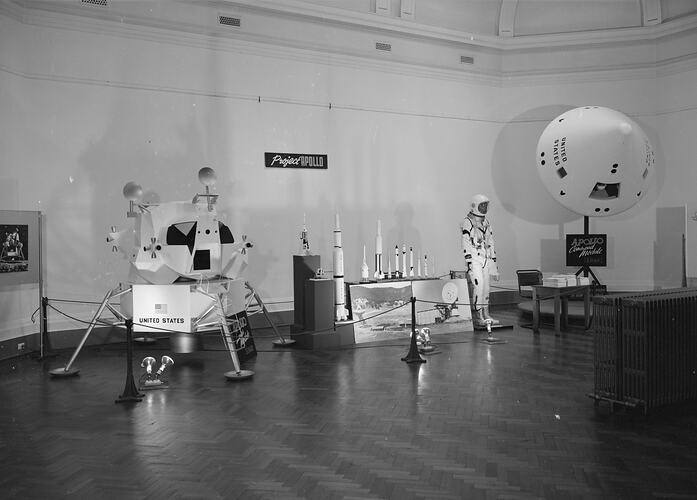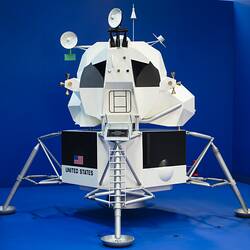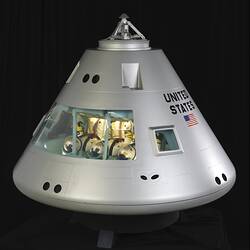Summary
Image of the Apollo Space Project exhibition in McArthur Hall at the Institute of Applied Science (later known as the Science Museum and a precursor to Museums Victoria), 1968. This display was provided by the Department of Supply in conjunction with the United States Information Service.
The NASA Apollo space program was a highly significant American enterprise that succeeded in taking humans to the moon. It began in 1961 and finished in 1972. Eleven space flights were undertaken, including seven manned flights - of these, six landed men on the moon (Apollo 11, 12, 14, 15, 16 and 17).
The Museum's Apollo exhibition opened in October 1968, the same month that the Apollo 8 mission became the first crewed space vehicle to orbit the moon.
The space vehicle models in this photograph probably represent the vehicles from the Apollo 8 mission, marking the historic moment.
The Apollo spacecraft were made up of three separate units - the Command, Service and Lunar Lander modules. In this photograph the Apollo Lunar Module can be seen at left (at 1/3 scale) and the Apollo Command Module at right (at 1/2 scale), while various rockets, (probably the Saturn 1B and Saturn V rockets used in the Apollo flights) and an astronaut spacesuit are on display in the middle.
The first successful human landing on the moon took place in July 1969 when Apollo 11 put two astronauts, Neil Armstrong and Edwin 'Buzz' Aldrin, on the moon and returned them and another crew member Michael Collins safely to earth.
This image is a copy negative and is part of the Science Museum of Victoria negative collection, which is a record of some of the museum's exhibitions and activities during the mid-late 20th century.
Description of Content
Apollo Space Project Exhibition.
Physical Description
Black and white negative.
More Information
-
Collection Names
-
Collecting Areas
-
Place & Date Depicted
Science Museum of Victoria (SMV), 328 Swanston Street, Melbourne, Melbourne, Victoria, Australia, 1968
The exhibition opened in October 1968 according annual report covering July 1968- June 1969, p.14. -
Format
Negatives - Copy, Black & White
-
Classification
-
Category
-
Discipline
-
Type of item
-
References
[Link 1] accessed 10 March 2022 [Link 2] accessed 10 March 2022 [Link 3] accessed 10 March 2022
-
Keywords
Museum History, Exhibitions, Displays, Space, Space Exploration, Space Technology, Spacecraft, Spacesuits, Astronauts, The Moon, Apollo Project Space Missions, Rockets, Models & Modelmaking



